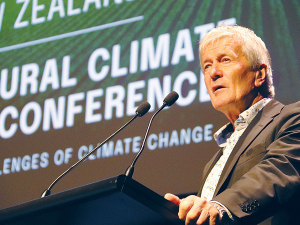Damien O’Connor: NZ united on global trade
When it comes to international trade, politicians from all sides of the aisle are united, says Labour's trade spokesman Damien O'Connor.
 Agriculture Minister Damien O’Connor claims concerns around climate change are driving international consumer preferences.
Agriculture Minister Damien O’Connor claims concerns around climate change are driving international consumer preferences.
Look for market trends, rather than market signals.
That was the key message from Agriculture Minister Damien O'Connor speaking at the recent Agricultural Climate Change conference in the capital.
O'Connor says the reality is that market trends give a longer term view and give producers and marketers more advanced warning of what consumers are looking for, and NZ has to be on the ball, ready to change.
In his opening remarks to the conference, O'Connor made reference to the changes and disruption which are now a part of daily life in the primary sector. He noted the impacts of climate change, proof of which he says is evident in particular by the disastrous trail of damage caused by Cyclone Gabrielle.
"With few exceptions, most people now recognise that climate change is a reality and that we as humans have contributed to it."
O'Connor claims concerns around climate change are driving consumer preferences and this also includes some of the big multi-nationals such as Nestle, which buy our products. He says they have committed to eliminate emissions from their supply chain and says he's not too sure how they will apply that to their individual suppliers such as NZ.
"But clearly those sort of signals show there are some... risks emerging and we may face some barriers," O'Connor added.
"I can tell you that having negotiated the UK and EU FTAs, for the most part, people don't necessarily want our products. We can only feed about 40 million people, so our contribution to global food security is not huge in quantum, but in technology, yes, we can play a bigger part."
O'Connor says NZ has to be at the forefront of food safety, quality, premiumisation and marketing.
He says, at the moment, NZ is not facing any trade barriers in relation to its emissions status, but we ignore the risks at our peril and to future generations.
Horticulture New Zealand (HortNZ) has added its perspective to numerous primary sector voices urging the Government to strengthen its draft legislation to replace the Resource Management Act (RMA).
The Commerce Commission has finalised new information disclosure requirements for local councils and water organisations that deliver water supply and wastewater services.
Beef + Lamb NZ (B+LNZ) is calling for significant changes to the Government’s reforms to the Resource Management Act (RMA).
NZPork says the Government needs to strengthen its proposed planning laws to ensure New Zealand's pig farmers can continue to produce pork.
Good news for kiwifruit growers - a record crop with forecast per hectare returns at record levels for all fruit categories for the 2025-26 season.
As guests gathered on what is known as the Speaker's Lawn - a beautifully manicured patch of grass behind the main buildings of Parliament - to mingle and enjoy a lamb chop to celebrate National Lamb Day, the mood was very much upbeat.

OPINION: The proverbial has really hit the fan in Wellington and exposed a glaring example of a double standard in…
OPINION: Dark suited spin doctors exist to, well, spin, and the nice cuddly progressive types at Greenpeace Aotearoa practice this…